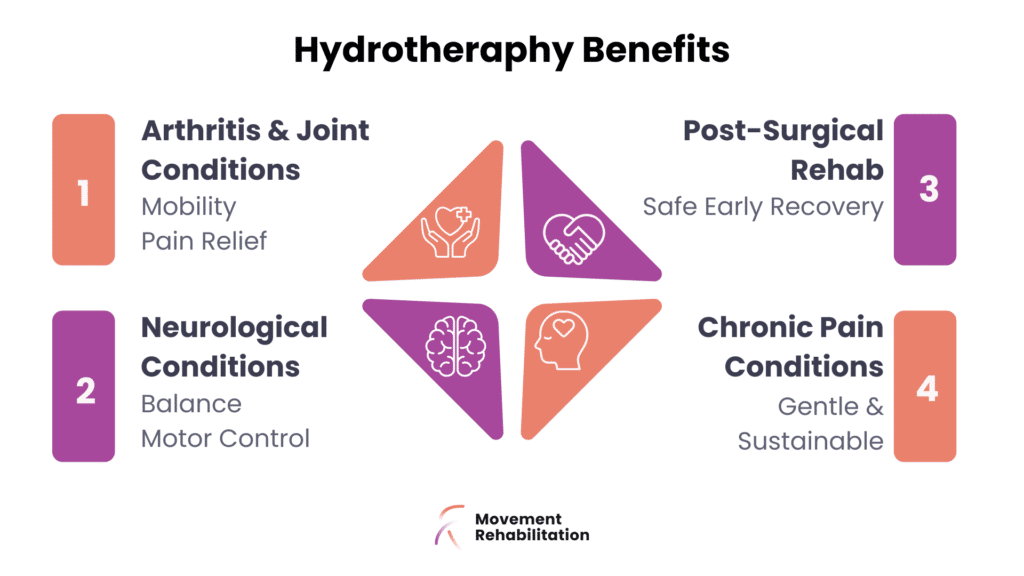Is hydrotherapy appropriate for your specific conditions or circumstances?
It’s one of the most common questions we get at Movement Rehabilitation.
While hydrotherapy can benefit a wide range of people, understanding who is most likely to see significant improvements helps set realistic expectations and guides treatment decisions.

People with Arthritis and Joint Conditions
Arthritis sufferers represent the largest group of hydrotherapy beneficiaries, and for good reason.
The combination of pain relief, improved mobility, and safe exercise makes hydrotherapy particularly valuable for:
- Osteoarthritis: Especially affecting knees, hips, and spine. The weight reduction from buoyancy allows movement that might be impossible on land, while warm water helps manage pain and stiffness
- Rheumatoid Arthritis: During stable phases of the condition, hydrotherapy can help maintain joint mobility and muscle strength while providing pain relief. The anti-inflammatory effects of regular exercise in warm water can complement medical management
- Ankylosing Spondylitis: The spinal flexibility and breathing exercises possible in water can be particularly beneficial for this condition, which primarily affects the spine and pelvis.
- Psoriatic Arthritis: Similar benefits to rheumatoid arthritis, with the additional advantage that many people find warm water soothing for associated skin symptoms.
Post-Surgical Rehabilitation Patients
Hydrotherapy has become increasingly popular in post-surgical care because it allows for earlier mobilization with reduced risk:
- Joint Replacement Recovery: Hip and knee replacement patients can often begin gentle movement in water weeks before they can safely exercise on land. The buoyancy support protects the healing joint while promoting circulation and preventing stiffness
- Spinal Surgery Recovery: Back surgery patients benefit from the spinal decompression effect of water immersion, combined with the ability to perform gentle movements that promote healing without strain.
- Sports Injury Rehabilitation: Athletes recovering from various injuries can maintain fitness and begin rehabilitation earlier in water than on land, potentially reducing overall recovery time.
Neurological Condition Management
The unique properties of water make hydrotherapy particularly valuable for neurological conditions:
- Multiple Sclerosis: The temperature-controlled environment addresses heat sensitivity issues, while buoyancy assists with mobility challenges. Many MS patients find they can move more freely in water than anywhere else.
- Parkinson’s Disease: The resistance of water can help with movement initiation, while the sensory input may improve motor control. Balance training in water is safer than on land
- Stroke Recovery: The supportive environment allows for movement practice and strength building while reducing fall risk. The sensory input from water can also aid in neuroplasticity
- Spinal Cord Injury: Depending on the level and completeness of injury, hydrotherapy can provide opportunities for movement and exercise that might not be possible on land.
Chronic Pain Conditions
People with various chronic pain conditions often find hydrotherapy to be one of the few forms of exercise they can tolerate:
- Fibromyalgia: The gentle nature of water exercise, combined with pain relief from warm water, makes hydrotherapy particularly suitable for this condition
- Chronic Back Pain: Especially for people over 60, hydrotherapy has shown significant benefits for pain reduction and functional improvement
- Chronic Fatigue Syndrome: The reduced energy expenditure required for water exercise can make it more manageable for people with limited energy reserves.
What’s next?
Hydrotherapy isn’t a one-size-fits-all solution, but its versatility makes it a powerful option for many people dealing with pain, limited mobility, or recovery challenges.
A warm, supportive environment of the water can make movement easier and more effective, but the key is tailoring the program to your specific needs and goals.
If you’re unsure whether hydrotherapy is the right fit, reach out to our team at Movement Rehabilitation. We can assess your needs and guide you toward a tailored plan that supports your long-term health.